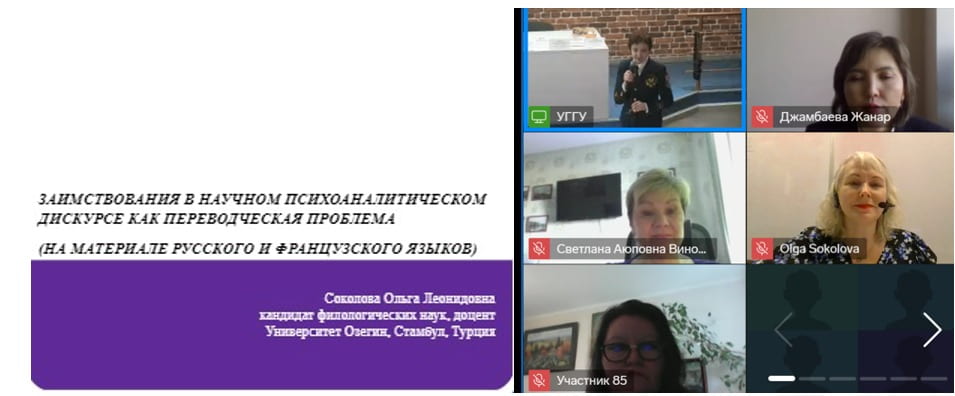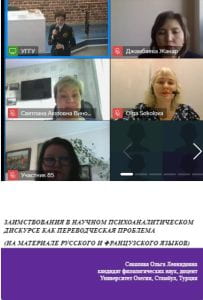Reflections on the conference “Current Issues in Linguistics, Intercultural Communications and Foreign Languages Teaching Methods” by Olga Sokolova
 On April 5th 2024, I took part in the VII International Scientific and Practical Conference “Current Issues in Linguistics, Intercultural Communications and Foreign Languages Teaching Methods” in Ural State Mining University (Yekaterinburg, Russia). There are a lot of foreign students in this University, especially from China, Kazakhstan, some African countries.
On April 5th 2024, I took part in the VII International Scientific and Practical Conference “Current Issues in Linguistics, Intercultural Communications and Foreign Languages Teaching Methods” in Ural State Mining University (Yekaterinburg, Russia). There are a lot of foreign students in this University, especially from China, Kazakhstan, some African countries.
This year it was a bit extraordinary, because during the plenary session, colleagues from the universities of Moscow, St. Petersburg, other Russian cities in Siberia and the Urals, and Astana (Kazakhstan) spoke about purely linguistic problems: metaphors and metonymies, neologisms in the press, individual literary style etc. There was no presentation on didactic methods, my presentation was the only one about translation and intercultural communication.
The conference was organized by the Department of Foreign Languages and Business Communications. The topic of my online report is: “Borrowed Terms in Scientific Psychoanalytic Discourse as a Translation Problem (based on Russian and French languages)”. I presented it online, in Russian.
For 12 years I have been collaborating with the European Association for the Development of Psychotherapy and Psychoanalysis, I have been translating conferences, masterclasses, individual and group supervision from Russian into French, and therefore I have a lot of interesting material that makes me think on the nature of languages, translation tips and the impact of different cultures on understanding.
 The problem is that very often there is what we call vocabulary asymmetry, when a term in one language has several equivalents in the other. Typically, equivalents become more specialized and have nuances of meaning that translators need to be familiar with. But sometimes the terms are borrowed from different languages, and in this case the nuances are more or less clear for native speakers, but not at all obvious for specialists from other countries as soon as they have only one term.
The problem is that very often there is what we call vocabulary asymmetry, when a term in one language has several equivalents in the other. Typically, equivalents become more specialized and have nuances of meaning that translators need to be familiar with. But sometimes the terms are borrowed from different languages, and in this case the nuances are more or less clear for native speakers, but not at all obvious for specialists from other countries as soon as they have only one term.
I described this problem and shared my experience giving examples of how this problem could be solved during oral translation. During the discussion, it was interesting and useful to discover that this problem obviously exists for other languages and other areas of human activity and that these strategies can be useful for colleagues.
I also introduced Ozyegin University to my colleagues and all listeners. I hope that the collaboration with the University of Mines will continue, the text of my presentation will soon be published in the collection of conference materials.
- Conference Title: VII International Scientific and Practical Conference “Current Issues in Linguistics, Intercultural Communications and Foreign Languages Teaching Methods”
- Presentation Title: : “Borrowed Terms in Scientific Psychoanalytic Discourse as a Translation Problem (based on Russian and French languages)”
- Presenter(s): Olga Sokolova
Brief information about the conference (location, theme(s), keynote speaker(s), length, etc.) April 5th 2024, Ural State Mining University Yekaterinburg, Russia (online participation).
This year, during the plenary session, colleagues from the universities of Moscow, St. Petersburg, other Russian cities in Siberia and the Urals, and Astana (Kazakhstan) spoke about purely linguistic problems : metaphors and metonymies, neologisms in the press, individual literary style etc.
Brief information about my/our presentation (research findings, presentation, abstract, paper, etc.)
Abstract: The presentation discusses the problem of asymmetry of terms, semantic and stylistic assimilation of borrowed terms, the problem of choosing an equivalent in the presence of synonymous terms in the target language. Analysis of equivalent pairs and contextual conditioning help translators find adequate solutions.
Key words: translation, terms, psychoanalysis, borrowings, equivalents.
“Highlights from the Conference
I described the problem and shared my experience giving examples of how this problem could be solved during oral translation. During the discussion, it was interesting and useful to discover that this problem obviously exists for other languages and other areas of human activity and that these strategies can be useful for colleagues.
Relevance to and application in our context
Intercultural communication, the meaning and equivalence of technical terms are aspects that should not be neglected when training future specialists.


Leave a Reply